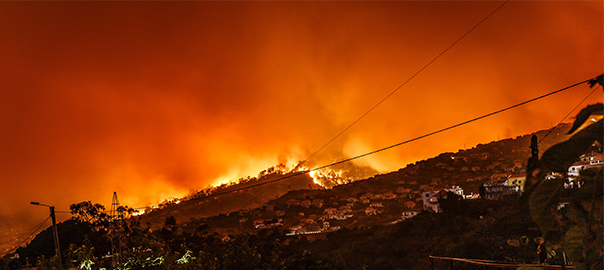If you are like me, you are excited to welcome the New Year, to put last year to rest and start fresh. It is no understatement that 2017 was a very difficult year, especially in terms of natural disasters—wildfires in California, hurricanes throughout the gulf of Mexico and Caribbean islands, and monsoons that ravaged Nepal, Bangladesh, and India affected thousands. Families were displaced, left without power or shelter, as well as necessities that we often take for granted. While many of us are starting the year fresh by making resolutions, there are many who are being forced to make a fresh start because a natural disaster destroyed the life they had built for themselves and their families this past year.
It is in the midst of disaster that many people and organizations step up to be the hands and feet of Christ, giving what they can to those affected, ministering in physical ways. But for many the needs left unmet are not physical but those of a mental, emotional, and spiritual nature. Natural disasters don’t just destroy our physical possessions but our emotional stability, robbing us of any sense of ownership we may have had over our lives.
Even when new possessions have been provided, victims of natural disasters often continue to struggle to adjust, feeling psychologically disconnected from new surroundings because nothing ‘smells like me,’ or ‘feels like mine.’ There is a perpetual sense of eating off of someone else’s dishes and sleeping on someone else’s bed. For that matter, victims may still be making payments on a mattress that was recently financed or a refrigerator that was purchased but then lost in a fire or flood.
Natural disasters force us to come to terms with the destructive nature of a world at war with itself, but they also allow us to see the amazing reconciling powers of God. For some, traumatic events have a way of drawing us closer to the Father, while others are left feeling alone and alienated in the midst of the chaos. As the Church, it is here that we need to step out, not only providing for the physical, but also for the emotional and spiritual needs of victims. It is only when these needs are met in a wholistic way that body and mind can begin to settle into a new ‘normal.’
Whether you have suffered through a natural disaster or are among those seeking to help, Jesus’ message in Matthew 6:19-34 speaks to everyone this new year. Here Jesus says that we shouldn’t let things like food or clothing—basic necessities—concern us, because God is the ultimate provider, and He cares for us. When we turn our attention to the Father and the things of the kingdom, we are better able to see how God provides for even the smallest of our needs.
God has already told us the ending to the story—He wants to redeem all of creation. He understands that the world is imperfect, ravaged with sin, pain, and injustice, and He has a plan to restore it all. We don’t know when this redemption will be complete (Matthew 24:36), and waiting for God to bring these plans to fruition is one of the most difficult lessons we can learn. However, He is in and over all, and thus we must bring ourselves low in the midst of a world full of suffering (1 Peter 5:6), humbling ourselves so that His power and prestige becomes evident to the world as He begins to usher in this new era.
So, let’s start the year, no matter where we find ourselves, by resolving to pray more and worry less. It is only then that we will truly begin to see changes in our lives as God is able to demonstrate His amazing provision for us. Start by joining us this month as we pray for the thousands of families who have been affected by natural disasters this past year.



Great article, Sarah! God bless.